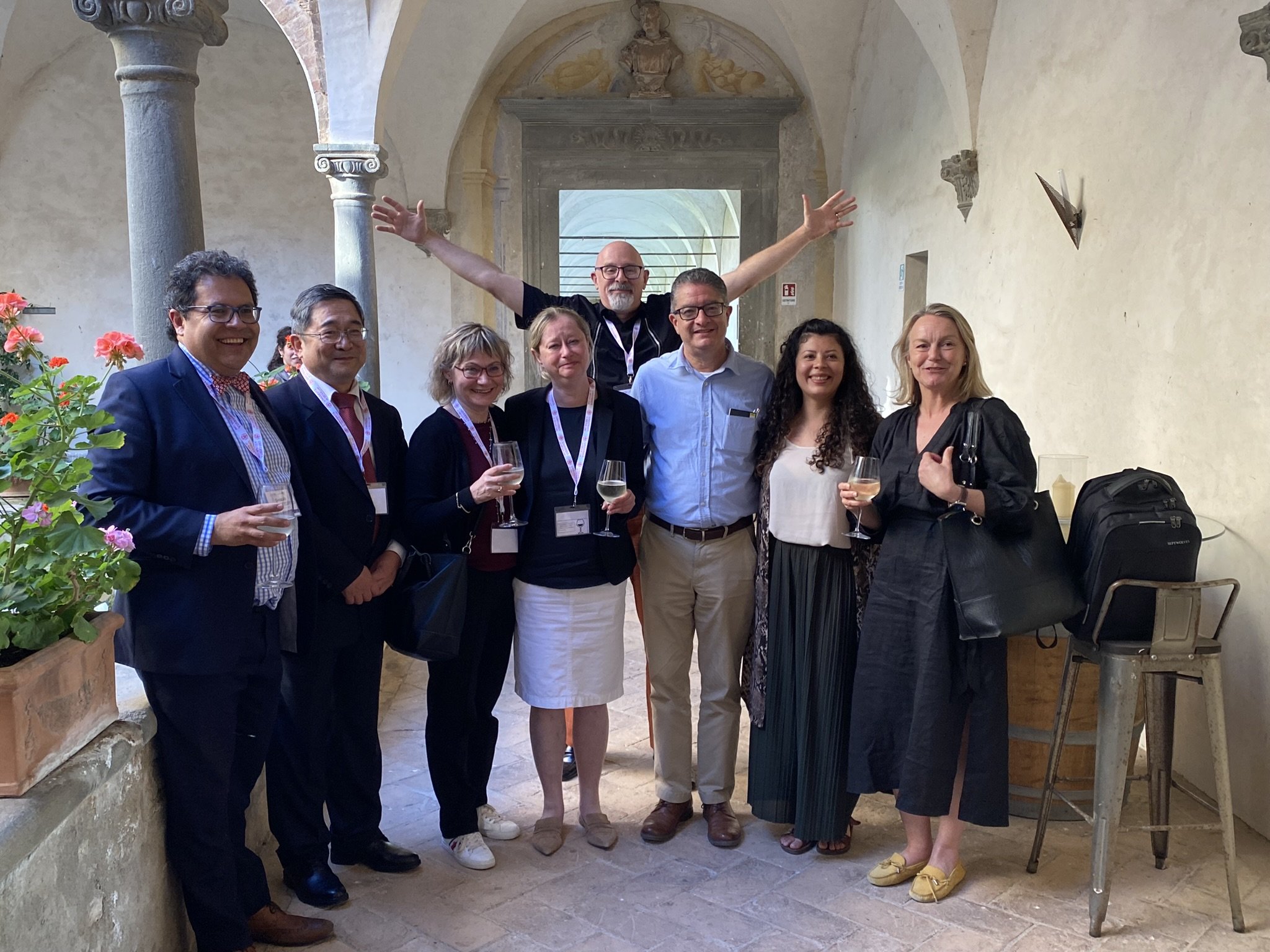“The Principle of Equality: New and Old Challenges”: IACL Roundtable Summary and Outcomes
/Merris Amos & Yasmin Dawood
Queen Mary University of London & University of Toronto
Equality is a central principle in constitutional law yet it raises a plethora of conceptual and practical challenges for jurists, theorists, legal scholars, and political scientists. To explore the various facets of equality, the IACL held a roundtable on “The Principle of Equality: New and Old Challenges,” which was hosted by the University of Siena on June 15-16, 2023. The roundtable, which featured speakers from around the world, brought together a truly global and comparative set of perspectives on the principle of equality in constitutional law. In this report, we have summarized the major themes of the roundtable. Given the number of speakers and topics, we have not provided a separate discussion of each speaker’s contributions (with the exception of the keynote speech and the closing remarks). For further details on the papers of individual speakers, please see the roundtable’s program.
The Meaning of Equality
In the opening keynote speech, Professor Tom Ginsburg (University of Chicago) shed light on the enormous complexity of the concept of equality, noting that while it is essential to constitutions, it remains a complex and elusive idea. Even the most basic understanding of equality—that persons who are equal should have equal things assigned to them—raises more questions than it answers. Which groups are we considering? What kinds of things are we comparing? If equality means that all persons should be treated as equals under the law, is formal equality sufficient? Or is equality under the law better understood through the lenses of substantive equality and anti-subordination theory? In addition, Professor Ginsburg introduced a distinction between the material dimension of equality and the expressive dimension of equality. The expressive dimension includes the ways in which constitutions recognize different categories of persons against whom the state may not discriminate. How we define equality, whether in constitutions or judicial decisions, has an important impact on politics and on people’s lives.
In the roundtable’s closing remarks, Judge Giuliano Amato (former President of the Italian Constitutional Court) observed that the non-discrimination principle is central to the concept of equality. Depending on the circumstances, however, equality can require both equal treatment and differentiation. New demands for equal treatment can create conflicts with older understandings of equality, which underscores the complex nature of equality. Throughout the roundtable, many speakers commented on the difficulties in defining equality and distinguishing equality from other concepts such as fairness and arbitrariness.
Constitutional Equality Clauses
As Tom Ginsburg reminded us, equality clauses are a feature of most constitutions, or constitutional bills of rights. Only the constitutions of Israel and Brunei do not feature some sort of equality clause. However, it is not possible to claim that societies are more equal as a direct result. As noted above, Ginsburg made a distinction between the expressive and material dimensions of constitutional equality clauses. A material clause is designed to change things whilst an expressive clause indicates our values, and where we would like to be. This type of blueprint, or guideline, shows where we want to go – but we might never get there.
But despite the high occurrence of constitutional equality provisions, some speakers observed that the constitutions of some states have never offered effective protection for equality – whether that be for minority rights in Africa, the people of devolved nations in the UK, or equality between the sexes in France. Furthermore, the governments of some states, such as those in Tunisia and Turkey, are intent upon limiting formerly broad constitutional protections for equality. And even those states which have the very best material clauses, such as the Western Balkans, are experiencing problems with implementation.
Law and Inequality
The challenge of using the law to recognize and remedy inequality was another roundtable theme. Despite the growth of prohibited grounds of discrimination, the law can overlook categories of persons who are treated unequally. How are we to identify new grounds of discrimination? How do we determine, and on what basis, that equality has not been achieved? A key problem is defining a minimum threshold for each right, for example with respect to social and economic rights, which would enable courts to identify when a right has been violated. Another difficulty is that even in those states with strong constitutional protections for social rights, implementation can pose significant challenges because of a lack of state capacity. There is often a gap between constitutional aspirations and the political culture. Nations with equality clauses, for example, may still experience significant levels of sex discrimination.
Equality, Courts and Judges
To be effective, law also relies on enforcement and many speakers discussed the difficulties courts and judges have in interpreting and applying constitutional equality clauses. There are constitutional courts, such as those in Turkey and Tunisia, which are doing their best in difficult circumstances with the tools that they have. International courts, such as the Inter-American Court of Human Rights, often rely on consensus to move their equality jurisprudence forward.
Some talked about how it was possible to successfully use legal tools to agitate for equality and how this type of litigation could influence policy development, aid implementation and change institutional practice. Many also referred to the achievements of lower courts, which, without the same high profile as constitutional courts or international courts, are often able to achieve significant advances without attracting the same level of criticism.
Judge Amato, in his closing remarks, outlined the difficulties faced by the Italian Constitutional Court in aligning the jurisprudence of the European Court of Human Rights with law and practice in Italy on questions such as the right to same sex marriage. He observed that it was not clear if this was a question appropriate for the courts, or for Parliament, and explained that if the court’s decision was not accepted by public opinion, the legitimacy of the court would be at stake. In his view, the optimal solution was to achieve institutional co-operation between the courts and the legislature, with the courts ultimately guided by the principle of public order.
Old Equality Challenges
Despite equality clauses existing for many years, another theme at the roundtable was the ongoing challenges associated with traditional categories of inequality. Several speakers focused on the problem of sex discrimination in a range of countries including Turkey, France, and Tunisia. There are a variety of challenges associated with remedying sex discrimination, including hostility to sex equality by illiberal and populist governments, the absence of a constitutional recognition of sex equality, and constitutional amendments that can subvert equality provisions. Speakers also drew attention to the challenges of sexual orientation discrimination. Even when states have strong protections against sexual orientation discrimination, such protections may be unavailable to asylum seekers. The recognition and protection of gender identity has likewise experienced challenges in states that have been regressive on this issue. The constitutional protection of gender identity has been conceptualized in various ways, including as being essential to health, self-determination, and equal dignity.
Speakers also focused attention on the rights of minorities. Some described the inadequate constitutional protection of minorities in various regions, including, for example, certain African states and the Balkans. In some countries, protections for minority groups has been imposed by the international community but such protections are less effective when not subject to international supervision. In addition, speakers drew attention to the rights of Indigenous peoples, noting that there can be a tension between the constitutional recognition of the right to autonomy, as in the Mexican Constitution, and the conflicts that arise between the Indigenous system of governance and the state constitutional order. Speakers also discussed the issue of race, including in the context of affirmative action in college admissions and new barriers to effective political participation by discrimination against classes of citizens in voting procedures.
New Equality Challenges
Finally an important theme to emerge from the roundtable was the numerous new equality challenges facing us today. Speakers taking part in the junior scholars panel were particularly good at reminding us that it is important to be alert to the various new ways in which unjustifiable inequality between groups can arise. For example, intergenerational justice is important not just in relation to climate change but to ensure that the state is taking the necessary positive action to protect those who will rely on state support in the future. There is a need to ensure equal access to physical public space, and to create inclusive data spaces where a balance is struck between individual self-determination and the rights of the big platforms. And it is important to never assume that established practice, such as the UN Sustainable Development Goals, do not raise equality challenges.
It is clear that there is still much to discuss when it comes to new and old challenges to the principle of equality. This roundtable was an excellent opportunity to reflect on where we are now and what more still needs to be achieved.
Merris Amos is Professor of Human Rights Law in the Department of Law, and Director of the Human Rights Law Centre, at Queen Mary University of London.
Yasmin Dawood is Professor of Law and the Canada Research Chair in Democracy, Constitutionalism, and Electoral Law at the University of Toronto.
Suggested citation: Merris Amos and Yasmin Dawood, ‘“The Principle of Equality: New and Old Challenges”: IACL Roundtable Summary and Outcomes’ IACL-AIDC Blog (24 August 2023) https://blog-iacl-aidc.org/2023-posts/2023/8/22/the-principle-of-equality-new-and-old-challenges-iacl-roundtable-summary-and-outcomes.









![Xx1088_-_Seoul_city_nightscape_during_1988_Paralympics_-_3b_-_Scan [test].jpg](https://images.squarespace-cdn.com/content/v1/5af3f84a4eddec846552ea29/1527486925632-3VZP3ASLAHP1LJI0D9NJ/Xx1088_-_Seoul_city_nightscape_during_1988_Paralympics_-_3b_-_Scan+%5Btest%5D.jpg)
